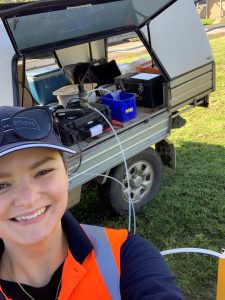 Marketing Assistant, Ross Hyne, recently interviewed HydroTerra Environmental Scientist, Kate Forwood, to discuss the importance of the International Day of Women and Girls in Science and what it means to her.
Marketing Assistant, Ross Hyne, recently interviewed HydroTerra Environmental Scientist, Kate Forwood, to discuss the importance of the International Day of Women and Girls in Science and what it means to her.
Q1. Why do you think it is important to celebrate the International Day of Women and Girls in science?
Historically women haven’t been given the same opportunities and recognition as our male counterparts in both the professional field as well as in education. International Day of Women and Girls in Science is one way that we can give recognition to deserving women and empower the next generation of young girls to take an interest and follow their passions in the world of science as they have so much to offer.
Q2. Have you ever faced any gender-based obstacles in pursuing a career in science or a related field?
Growing up I went to a co-ed primary school, and while we didn’t have science classes, I distinctly remember being only one of two girls in a maths class of more than 20 students. Learning in an overwhelmingly male dominated environment was challenging at times, and so I was fortunate to receive a secondary education in an all-girls school. In a classroom surrounded by female peers my scientific interests were welcomed and ultimately encouraged me to continue further study in a science degree at university.
Q3. What inspired you to pursue a career in science, and how do you hope to make a positive impact in this field?
I have always loved learning about how the world works, and at the same time always been draw to the world outside of the classroom walls. It was these two passions that led me to an Environmental Science degree, and into a career as an Environmental Scientist working at HydroTerra. This year’s International Day of Women and Girls in Science had a focus on the Sustainable Development Goals, and I hope that I can help the many people working to protect the environment not only for its own conservation, but for the wellbeing of our global community.
Q4. How can we encourage more women to pursue careers in science and help address the gender imbalance in this field?
I have been most inspired by seeing women as role-models in science, be it teachers, lecturers, academics, or industry professionals. I believe that recognition of the incredible women involved in science and their exposure to the next generation has a major role in encouraging girls to pursue careers in science and see more women in the space I work in!
To find out more about the day, visit the link here.






